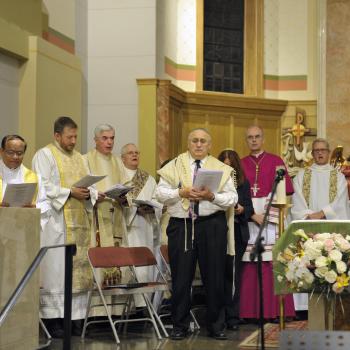The New York Times this morning has a brief Q&A with Patty Stonesifer, who runs Martha’s Table, a charitable organization based in Washington, DC. While not strictly a Catholic charity—though it was co-founded by a priest—Martha’s Table is run by a woman with a deeply Catholic sensibility, and she brings that to her leadership style:
Q. What were some early influences for you?
A. I’m the sixth of nine children. The most notable things about my family were that my parents had to achieve order at scale, and they were extremely community-oriented.
My dad was a sales manager for an auto dealership, and yet he found time on the way home to pick up excess food from the local grocery markets and repurpose it for those who needed food. We participated in the soup kitchen. He drove a bus for the deaf children who were coming to Sunday Mass. This idea of being part of a team really defined my childhood.
Tell me about your leadership style today.
I often tell my staff, “I’m adamant but not certain.” One of my mentors early on talked about the need for a leader to be a “certain trumpet.” It comes from Corinthians, and it’s a very good visualization — if the trumpet isn’t clear, who’s going to follow you? If you want people to go fiercely after something, you have to be certain.
I have a tendency to be a certain trumpet — perhaps too often — and that’s why I use the line “I’m adamant but not certain.” I want you to come back to me if you think there is something I’m missing.
How do you hire?
One of the things I really look for, directly or indirectly, is whether the candidate feels lucky. Do they realize that they’re fortunate to be where they are? I really want people around me who recognize that not everything is perfect and we can keep moving forward. There are opportunities here that we were given, and that the organization was given, and we’re lucky to have those opportunities. Let’s use them. In some ways, that embodies the sense that it’s not about you.
At Martha’s Table, I also can get a really good sense of whether I want to be working with somebody when I walk them through the place. It is a busy, crazy place with lots of programs going on to make sure there’s food for the hungry. I watch how the person reacts to the environment. Because if they’re not curious about the work, and it’s just a job, then I don’t want to work with them.
I’ll stop and introduce them to a half-dozen people, and see if it’s just a handshake or whether there’s some curiosity and interest. We talk a lot about dignity at Martha’s Table, and dignity comes first from, “I see you, I hear you, I know you.” The ultimate dignity is whether you’re really present for other people.
Great stuff. Read more.
Photo: Earl Wilson / The New York Times
















